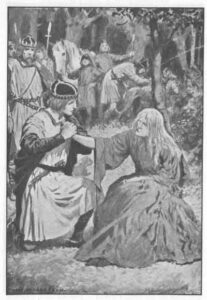I’ve spent most of my life being very surprised when people don’t treat me as a human being because I’m a woman. This probably had something to do with having a father who loved me fiercely. If the most important man of my life during my childhood and formative years could see me as human, it simply did not compute that some others could not.
As I write this from northern Virginia, where today’s snow is slowly hardening into ice, I’m thinking about the path my country may take, and whether or not our laws will move away from treating women as human entirely — and not just due to the possibility of the victory of Trumpist fascism, a federal ban on women’s healthcare (yes, abortion is healthcare), and other potential horrors. I love the United States, but like any human (here’s that word again), I just get so tired. I see too much craziness, including the religious kind. While there’s a bunch of people on the right embracing Christofascism, for example, a bunch of people on the left are currently discovering the “joys” and “liberation” of hardcore Islamism. It gets tedious.
A lot of people don’t know the value of living in a civilized society, because they’ve never lived in an uncivilized one. Not all of them are fucking stupid, but many are. Women tend to bear the brunt of communal flirtation with barbarism, and should the United States fully embrace the fringe derangement that’s infecting our politics, we’ll be screwed for a long, long time.
I’m not saying anything shocking or particularly revolutionary here. In fact, a lot of good ideas — such as not bowing to extremism — are very much cliched. It’s what makes bad ideas so appealing to insecure people in society, because they seem novel and daring and special by comparison. This is why protest votes for third-party doofuses in crucial election years can be so appealing. Doing your civic duty is boring by comparison.
A longtime friend of mine, a transgender woman who sadly passed away some years ago, once told me that when she came out to her family decades ago, her mom said, “I’ve always known you were different, but why would you choose any of this shit?” By “this shit,” she meant living as a woman. It was the only correct choice after years of dysmorphia and knowing something was terribly off, but in that moment her mother fretted about sexual harassment and domestic violence as much as she fretted about the people who simply would not accept her child.
“And she fretted for a damn good reason,” my friend darkly surmised.

That story was shared with me after I had left my own abusive marriage and was finding my feet again in a strange and sometimes hostile world. Neither my friend nor I had regrets about our big decisions, but they came with consequences nonetheless. Freedom usually does.
And yet freedom is the only acceptable state of being. In the story of Lady Ragnell (sometimes transcribed as Ragnelle), King Arthur must solve the most puzzling riddle known to men — what do women desire above all? A hideous woman named Ragnell promises to give Arthur the correct answer, but only if she can marry his handsome nephew, Gawain. Arthur doesn’t want this fate for his nephew, but Gawain finds out about the predicament and swears he will marry the ugly crone to help Arthur.
Ragnell says that women desire sovereignty. It proves to be the correct answer. Gawain and Ragnell have a lavish wedding, and Gawain treats her with respect at the celebration, in spite of her hideous looks. When they go to bed on their wedding night, Ragnell asks for a kiss and when Gawain approaches her, she transforms into a beauty.
Ragnell then gives her new husband a choice. She can be beautiful at night, and ugly in the daytime, or vice versa. Remember, public appearances are important for a knight.
Gawain weighs all of that, but doesn’t think it’s right for him to choose. He leaves the choice up to Ragnell.
Immediately, the enchantment is lifted. Ragnell can be beautiful all the time. Because women do desire sovereignty, and only by having the freedom to choose can they be the best wives. Sovereignty saves both Arthur and Ragnell herself.
Now, other people can debate whether this tale is “feminist” or not. I personally couldn’t give a shit. What I do know is that true love can only be offered in freedom, and that Gawain had more sense than a lot of people I know.
Next time you think that anger makes women ugly, consider how Gawain saved his marriage.
Image: Elina Fairytale

